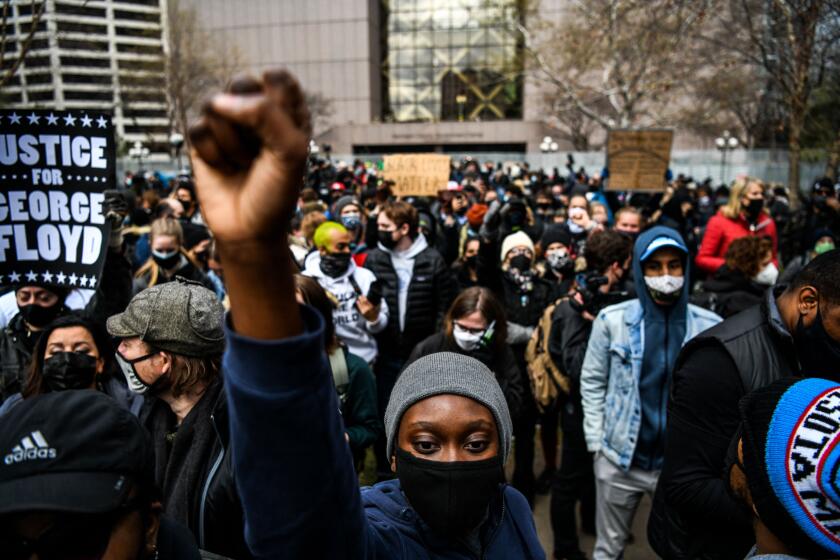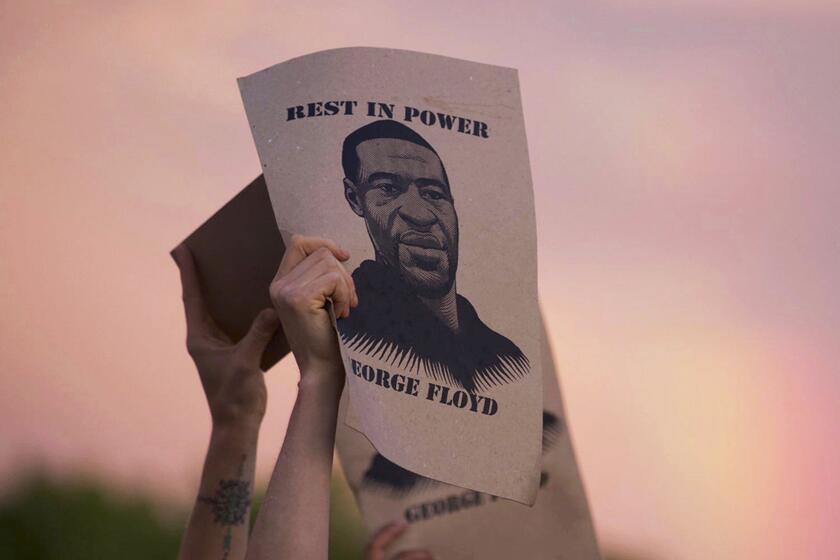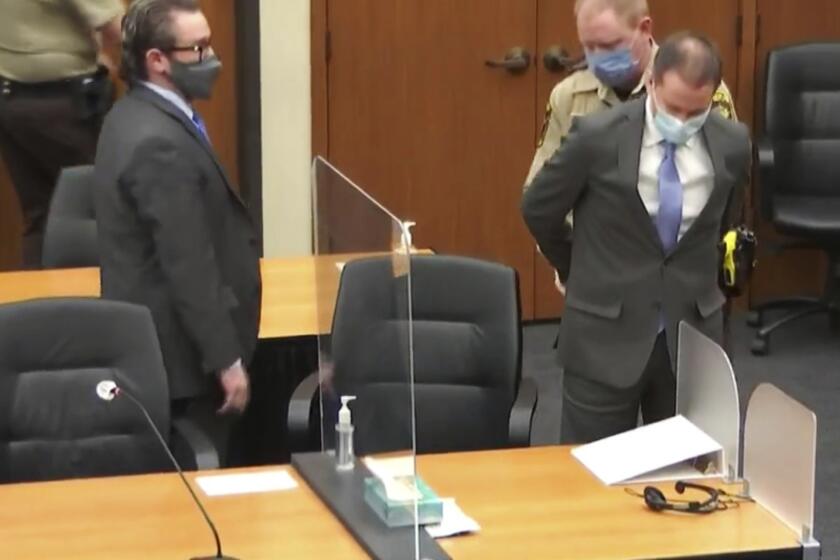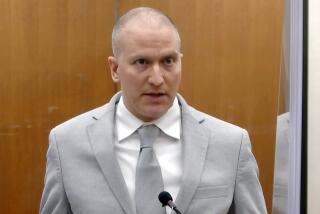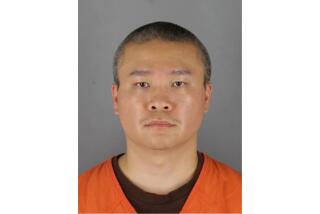What are the charges against Derek Chauvin?
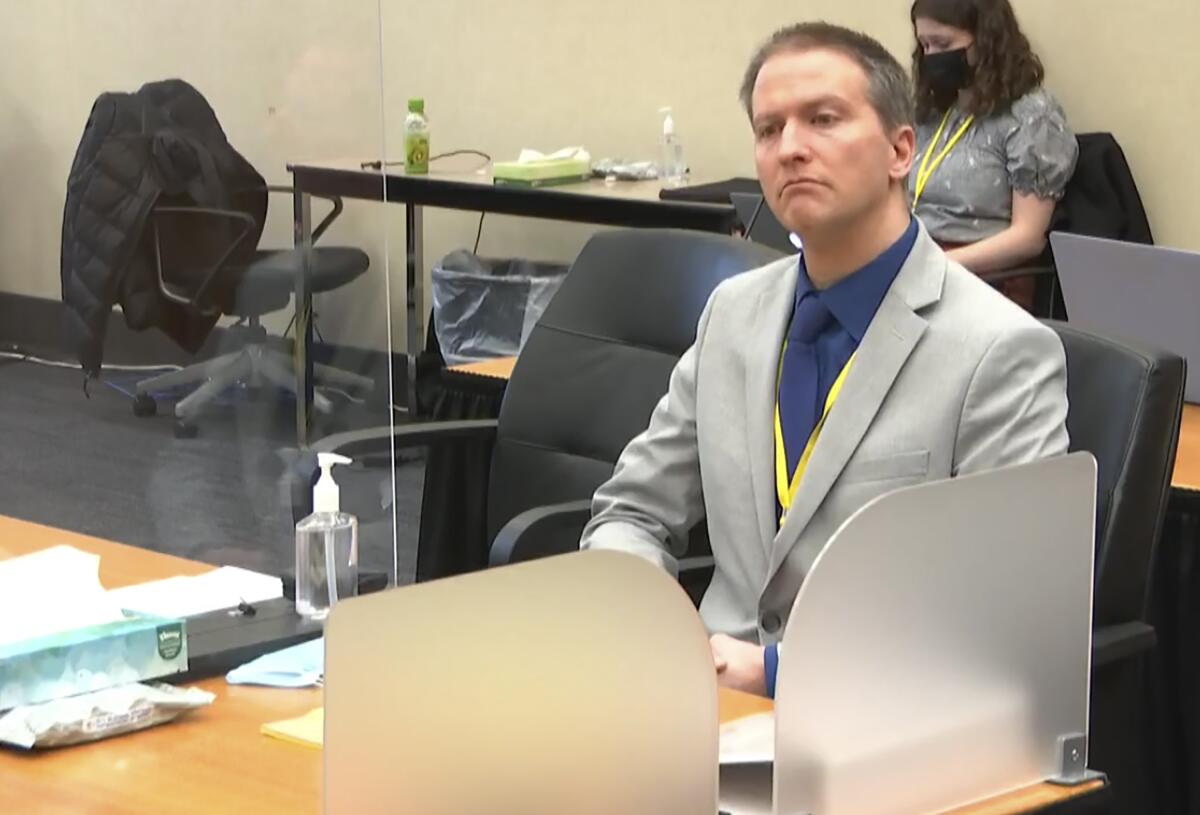
- Share via
MINNEAPOLIS — The 12 jurors deliberating the case against Derek Chauvin will have three counts to consider as they weigh whether he is responsible for the death of George Floyd.
Chauvin is charged with second-degree unintentional murder, third-degree murder and second-degree manslaughter. The case comes down to two key questions — whether Chauvin caused Floyd’s death and whether his actions were reasonable — and each charge requires a different element of proof as to Chauvin’s state of mind.
Here’s an explanation of the charges:
How do the charges against Chauvin compare?
For all three charges, prosecutors had to prove that Chauvin caused Floyd’s death and that his use of force was unreasonable.
Prosecutors didn’t have to prove Chauvin’s restraint was the sole cause of Floyd’s death, but only that his conduct was a “substantial causal factor.” Chauvin is authorized to use force as a police officer, as long as that force is reasonable.
The landmark case has riveted a nation wrestling with the issues of police brutality and racial injustice it raised.
To convict on any of these counts, jurors must find that Chauvin used a level of force that would be considered unreasonable to an objective officer in his position. Hindsight can’t be a factor.
The charges differ when it comes to Chauvin’s state of mind — with second-degree murder requiring some level of intent — not an intent to kill but that Chauvin intended to apply force to Floyd — all the way down to manslaughter, which requires proof of culpable negligence.
What’s second-degree unintentional murder?
It’s also called felony murder. To prove this count, prosecutors had to show that Chauvin killed Floyd while committing or trying to commit a felony — in this case, third-degree assault. They didn’t have to prove Chauvin intended to kill Floyd, only that he intended to apply force that caused bodily harm.
Prosecutors called several medical experts who testified that Floyd died from a lack of oxygen because of the way he was restrained. A use of force expert said it was unreasonable to hold Floyd in the prone position for 9 minutes, 29 seconds, handcuffed and facedown on the pavement.
“No reasonable officer would have believed that that was an appropriate, acceptable or reasonable use of force,” prosecution witness Seth Stoughton testified.
Defense attorney Eric Nelson tried to raise doubts about Floyd’s cause of death — saying underlying heart issues and drug use were to blame. He also argued that Chauvin’s actions were reasonable, saying Floyd was big, under the influence of something, could start fighting and that nearby bystanders presented a threat.
“It’s easy to sit and judge ... an officer’s conduct,” defense witness Barry Brodd testified. “It’s more of a challenge to, again, put yourself in the officer’s shoes to try to make an evaluation through what they’re feeling, what they’re sensing, the fear they have, and then make a determination.”
George Floyd’s death in police custody in May touched off a nationwide reckoning on race and led to the trial of ex-officer Derek Chauvin.
What about third-degree murder?
For this count, jurors must find Chauvin caused Floyd’s death through an action that was “eminently dangerous” and carried out with a reckless disregard for and conscious indifference to the loss of life.
Mark Osler, a professor at University of St. Thomas School of Law, said prosecutors tried to prove the elements of this count through testimony about the dangers of subduing a handcuffed person in the prone position.
Dr. Martin Tobin, a lung and critical care specialist, testified for the prosecution that any healthy person subjected to this restraint would have died. Minneapolis Police Lt. Johnny Mercil, a use-of-force instructor, testified that officers are trained to “stay away from the neck when possible.” Osler said Police Chief Medaria Arradondo was also effective in showing that Chauvin was not trained to use such a hold.
“They wanted to have a lot of evidence showing that what Chauvin did is not what he was trained to do and that the reason they don’t train people to do that is because it’s eminently dangerous,” Osler said.
And second-degree manslaughter?
Prosecutors had to show that Chauvin caused Floyd’s death through culpable negligence that created an unreasonable risk, and that he consciously took the chance of causing severe injury or death.
Testimony that revealed Chauvin should have known to put Floyd in a side recovery position, that he should have provided medical care before paramedics arrived and that he stayed in his position after he was told Floyd didn’t have a pulse could all point to negligence, said former U.S. Attorney Tom Heffelfinger.
The jury in the trial of Derek Chauvin convicted the former Minneapolis police officer of murder in the death of George Floyd.
What does Chauvin face if convicted?
Each count carries a different maximum sentence: 40 years for second-degree unintentional murder, 25 years for third-degree murder, and 10 years for second-degree manslaughter.
But under Minnesota sentencing guidelines, for a person with no criminal history, each murder charge carries a presumptive sentence of 12 1/2 years in prison, while manslaughter has a presumptive sentence of four years.
Prosecutors are seeking a sentence that goes above the guideline range. They cited several aggravating factors, including that Floyd was particularly vulnerable, that Chauvin was a uniformed police officer acting in position of authority, and his alleged crime was witnessed by multiple children — including a 9-year-old girl who testified that watching the restraint made her “sad and kind of mad.”
If jurors convict Chauvin, it’s expected they will hear arguments about these aggravating factors and decide whether Chauvin should be sentenced above the guidelines, Osler said. The sentence itself will be up to the judge. In Minnesota, defendants typically serve two-thirds of their penalty in prison, with the rest on parole.
More to Read
Sign up for Essential California
The most important California stories and recommendations in your inbox every morning.
You may occasionally receive promotional content from the Los Angeles Times.
